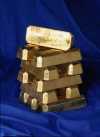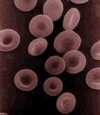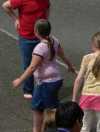In the News
 US Officials Declare Satellite Shootdown a SuccessA US spy satellite that lost power shortly after its 2006 launch and has since been orbiting Earth with an unused tank of toxic fuel was intercepted on Thursday by a missile launched from a US Navy warship. Experts worried that the satellite, which was falling out of orbit, could pose a threat to people when it reentered the atmosphere with about 1,000 pounds (453 kilograms) of dangerous hydrazine propellant on board, but officials now believe that the missile adequately destroyed the fuel tank. Many countries opposed the controversial operation, believing it to be a thinly disguised attempt to test an anti-satellite weapon and worrying that it could prompt an arms race in space. More on the subject... |
In the News provided by The Free Dictionary
In the News
 Fidel Castro Resigns as Cuba's PresidentFidel Castro has been Cuba's unchallenged leader since 1959, when he led the revolution overthrowing Fulgencio Batista. He reshaped Cuba into a communist state; and while the United States was the first country to recognize Castro's government, it quickly became one of Cuba's greatest opponents. In 2006, Castro fell ill and temporarily ceded control of the government to his brother Raul. On Tuesday, the 81-year-old, ailing Cuban leader announced that after nearly 50 years of leadership, he is resigning as Cuba's president. Dissidents hope that Castro's retirement will open the door to democratic change in Cuba. More on the subject... |
In the News provided by The Free Dictionary
In the News
 Humans Touch Every OceanMore than 70% of Earth's surface is covered by oceans, and only 4% of the world's marine waters remain undamaged by human activity. A newly published study has concluded that climate change, pollution, fishing, and other factors have heavily damaged nearly half of the world's ocean waters. Ecosystems such as coral-reefs, continental shelves, and the deep ocean were hardest hit, while Polar Regions remained the least affected. More on the subject... |
In the News provided by The Free Dictionary
In the News
 Toxic Trailers Home to Hurricane VictimsTens of thousands of people lost their homes during Hurricane Katrina in 2005, and approximately 35,000 families are still living in the cramped, government-supplied trailers provided as a temporary housing solution. In 2006, trailer occupants began reporting health problems such as headaches and nosebleeds, and tests have now shown that many of the homes contain dangerously high levels of formaldehyde fumes. Formaldehyde, a preservative commonly used in construction materials, can lead to breathing problems and is also believed to cause cancer. US government officials have pledged to step up efforts to move Katrina victims out of the trailers. More on the subject... |
In the News provided by The Free Dictionary
In the News
Astronomers Discover Distant Solar SystemAstronomers using a promising new technique for detecting celestial bodies have announced the discovery of a distant solar system that appears to be "a scaled-down analog of our solar system." Two planets, similar in size and orbit to Jupiter and Saturn, were observed orbiting a smaller, dimmer, and fainter version of our sun. The planets were revealed using an astronomical technique called gravitational microlensing, in which light from faraway planets is bent and magnified by the gravity of a foreground object, in this case another star. This bending of light, called the gravitational lens effect, allows astronomers to detect objects that emit little or no light. More on the subject... |
In the News
 Primitive Bats Flew "Blind"A 52-million year-old bat fossil found in Wyoming has given scientists a unique insight into when the flying mammals evolved the ability to echolocate. Echolocation is a sonar-like navigation technique in which animals emit high-pitched sounds and use the resulting echoes to determine the distance and direction of objects around them. The well-preserved skeleton lacked certain bone structures crucial to echolocation, settling the longstanding debate about which came first in bats-echolocation or flight. Many experts had favored an "echolocation first" theory, but the discovery of the newly named Onychonycteris finneyi has largely disproved that notion. More on the subject... |
 Artificial Sweeteners May Lead to Weight GainThe use of artificial sweeteners in food and beverages has more than doubled in the past 20 years, and so has the obesity rate. Though it seems counterintuitive, the use of no-calorie sweeteners like saccharin may actually lead to weight gain. A study of rats fed yogurt sweetened with either sugar or saccharin found that the saccharin-fed rats consumed more calories, put on more fat, and gained more weight than their sugar-fed counterparts. Researchers suggest that consuming a sweet tasting food or beverage primes the digestive system for a high-calorie arrival. When the calories do not arrive, the body may become confused and be less able to regulate appetite. More on the subject... |
In the News provided by The Free Dictionary
In the News
 Vacuuming Arteries Could Help Heart Attack VictimsMost heart attacks are triggered when the atherosclerotic plaque lining a coronary artery ruptures, causing a blood clot to form and blocking the flow of oxygenated blood to the heart. Doctors generally treat the condition with an operation to unblock the artery called an angioplasty. The blockage is generally compressed rather than removed during this procedure, and then a tiny metal-mesh device is inserted to keep the artery open. Recently, a team of Dutch doctors began removing these blockages with a vacuum cleaner-like device, and they found that the debris removal improves outcomes among heart attack patients and increases their survival rates. More on the subject... |
In the News provided by The Free Dictionary
In the News
 Pre-Chewing Food Can Spread HIVHealth officials have announced that the practice of pre-chewing food for infants can spread AIDS. Between 1993 and 2004, three such cases were reported in the US, where the practice is fairly uncommon; but in developing nations, mothers often have no other means of pulverizing food for toothless infants, and the risk of transmission may be greater there. The disease is not carried in saliva and was likely transmitted orally because the caregivers had bleeding gums or mouth sores when they were chewing the food. The infants were probably teething at the time of infection, and this may have caused them to be more susceptible to the oral transmission. More on the subject... |
In the News provided by The Free Dictionary
In the News
 Scientists Create Embryo with Three ParentsScientists working in a laboratory have managed to create an embryo using genetic material from three people. The researchers did this by removing the nucleus of a freshly created embryo and transplanting its genetic material into a donor egg whose own DNA had been largely removed. The genetic material left in the donor egg controls the production of mitochondria, organelles often referred to as cellular "powerhouses." The hybrid embryo thus contains the combined DNA of two women and one man. Scientists believe that this sort of procedure could one day lead to the eradication of hereditary mitochondrial diseases like muscular dystrophy, epilepsy, and mental retardation. More on the subject... |
In the News provided by The Free Dictionary
In the News
 Can Stressful Pregnancies Cause Schizophrenia?Previous research has linked stress during pregnancy to an increased risk of low birth weight and premature birth, and data from a new study now link a mother's psychological state during pregnancy with the a child's risk of developing schizophrenia. According to researchers, the risk of schizophrenia and other related disorders is approximately 67% greater among people whose mothers suffered the loss of a loved one during the first trimester of pregnancy. Researchers suggest that the stress of bereavement may lead the mother's brain to release chemicals that affect the fetus' early development. More on the subject... |
In the News provided by The Free Dictionary
In the News
 Fat People Die Sooner, Cost Less for HealthcareWeight-loss products are part of a multibillion dollar industry aimed at combating the worldwide obesity epidemic. Many argue that obesity leads to a number of serious medical conditions that cost governments millions of dollars to treat. It stands to reason, then, that preventing obesity could significantly reduce healthcare spending; but a group of Dutch researchers has concluded that the health costs associated with thin, healthy adults are greater than those of either obese people or smokers. The researchers found that while obese people rack up the most expensive health costs earlier in life, they die sooner than healthy people and cost less to treat in the long run. More on the subject... |
In the News provided by The Free Dictionary
In the News
_CIN3.jpg) Unborn Twins Dislodge Mother's Cervical TumorMichelle Stepney was pregnant with twins when she experienced bleeding and, suspecting a miscarriage, went to the hospital. There, she was diagnosed with cervical cancer but refused to terminate her pregnancy to undergo treatment. Instead, she agreed to low dose chemotherapy treatment to keep the cancer in check throughout the course of her pregnancy and planned to have a hysterectomy after the twins were born. According to doctors, Stepney's active twin girls dislodged her cervical tumor with their vigorous kicking, alerting doctors to a condition that might otherwise have gone undiagnosed, and saved their mother's life. More on the subject... |
In the News provided by The Free Dictionary
Article of the Day
 Evidence of Alien Life?A pulsar is a rapidly spinning neutron star that emits radiation in narrow beams focused by the star's magnetic field. Because the pulsar's magnetic poles do not align with the poles of its rotational axis, the beams sweep around like the beacon of a lighthouse and are thus observed on Earth as short, regular pulses. Some scientists initially suggested that extraterrestrial civilizations were the source of the strange signals. What did they plan to do if their suspicions were confirmed? More... |
Article of the Day provided by The Free Dictionary
In the News
 Why Does it Feel Good to Scratch?According to a team of dermatologists, there is a perfectly logical reason why scratching an itch feels so good-it temporarily shuts off the area of the brain associated with unpleasant feelings and memories. After using fMRI to observe the brains of 13 participants while they were being scratched, researchers determined that scratching reduced activity in both the anterior cingulate cortex and the posterior cingulate cortex. The more intensely a person was scratched, the more depressed activity was in those regions of the brain. Brain activity did increase in areas linked to pain and compulsive behavior and may help explain the compulsion to continue scratching. More on the subject... |
In the News provided by The Free Dictionary
In the News
 Puerto Rican Albinos Carry Deadly Genetic DiseaseAccording to estimates, 1 in every 400 to 2,000 people worldwide carry the gene for a fatal strain of albinism called Hermansky-Pudlak syndrome, but in northwestern Puerto Rico, an estimated 1 in 20 are carriers. It is likely that a single settler brought the genetic defect to the island, where intermarriage among the isolated population allowed it to proliferate. Type 1 of the disease often leads to a lung condition known as pulmonary fibrosis, in which scar tissue builds up in the lungs and smothers the air sacs that allow oxygen to pass into the bloodstream. Patients generally have a life expectancy of 5 years after being diagnosed with the lung condition. More on the subject... |
In the News provided by The Free Dictionary
In the News
 All That Glitters is Not GoldIn a fantastic feat of optical alchemy, scientists have managed to colorize metals using ultrashort laser bursts to mottle the surfaces of various metals, allowing them to control the way in which light is both reflected and absorbed. Each laser burst lasts only a few quadrillionths of a second and vaporizes atoms near the metal's surface. The pockmarks are imperceptible to the human touch, and the metal's surface still feels smooth, but the minuscule pits can make aluminum and platinum look like gold and can make gold appear black. A number of jewelers have already expressed interest in the colorizing technology, and developers say that the technique could eventually be used to manufacture custom-colored cars that need no paint. More on the subject... |
In the News provided by The Free Dictionary
Article of the Day
 Bruce LeeBorn in the year of the dragon, Bruce Lee grew to become one of the most influential martial artists of the 20th century. His action films sparked the first major surge of interest in Chinese martial arts in the West. Though Lee spent countless hours training and improving his physique, he was also a philosopher and avid reader. He collapsed while working on his final film Enter the Dragon and died a short time later. His son, Brandon, was killed while filming a scene for what 1990s film? More... |
Article of the Day provided by The Free Dictionary
In the News
 Caffeine Can Increase Blood Sugar in DiabeticsCutting caffeine from one's diet may help control type-2 diabetes. A new study has found that consuming the caffeine equivalent of four cups of coffee in one day can increase average daily blood sugar levels by 8%. While previous studies have indicated that people who drink coffee have a reduced risk of type-2 diabetes, the data from this experiment indicate that caffeine can lead to a significant surge in blood sugar levels. The effect was particularly strong after meals, with blood sugar rising 9% after breakfast, 15% after lunch, and 26% after dinner. More on the subject... |
In the News provided by The Free Dictionary
In the News
 Transplant Patient's Body Switches Blood TypeThe immune system is designed to attack foreign bodies, and the unrecognized tissue of an organ transplant is no exception. Drugs that suppress the immune system are used to prevent organ rejection, but they leave patients susceptible to infection. Excitingly, a 15-year-old Australian girl has become the world's first known transplant patient to change blood groups and take on the immune system of her organ donor. Doctors suspect that a post-operative infection may have allowed stem cells from the donor liver to migrate into Demi-Lee Brennan's bone marrow and proliferate. If doctors learn to manipulate this process, they will be able to improve transplant outcomes for thousands of patients. More on the subject... |
In the News provided by The Free Dictionary
This Day in History
 Outer Space Treaty Signed (1967)The Outer Space Treaty represents the basic legal framework of international space law. It bans the stationing of weapons of mass destruction in outer space, exclusively limits the use of the Moon and other celestial bodies to peaceful purposes, and forbids any government from claiming a celestial resource, such as the Moon or a planet, on the grounds that they are the common heritage of mankind. When did the treaty enter into force? More... |
This Day in History provided by The Free Dictionary
In the News
 Researchers Create Synthetic Bacterium GenomeScientists have taken another step forward in the pursuit of creating artificial life, successfully assembling the full genome of the bacteria Mycoplasma genitalium in a laboratory. M. genitalium has one of the smallest genomes of any living organism; all of its genetic material is carried on a single circular chromosome built from approximately 580,000 base pairs of adenine (A), guanine (G), cytosine (C), and thiamine (T), the building blocks of all DNA. The successful synthetic recreation of the bacterium's genome raises key questions about the ethics of creating synthetic and artificial organisms. More on the subject... |
In the News provided by The Free Dictionary
In the News
 First Subglacial Eruption Discovered in AntarcticaMany environmentalists believe that the melting of Antarctica's glaciers is a direct result of global warming, but there is another factor that may be contributing to the ice's rapid thinning?volcanoes. Members of the British Antarctic Survey have identified a layer of volcanic ash and glass shards frozen within an ice sheet in western Antarctica. They believe that a rare volcanic eruption more than 2,000 years ago punched through the ice sheet, scattering ash and debris across the icy landscape. This new study is the first to show direct evidence of a relatively recent eruption from under the Antarctic ice sheet. More on the subject... |
In the News provided by The Free Dictionary
In the News
 Stem Cells Help Mice with Muscular DystrophyFor the first time, genetically manipulated embryonic stem cells were transplanted into mice afflicted with muscular dystrophy, and the rodents' muscle function improved. Muscular dystrophy is an umbrella term that covers nearly a dozen genetic diseases that primarily affect the muscles. The most common form of the disease, Duchenne muscular dystrophy (DMD), generally appears around age 3 or 4, and victims rarely live past 30. In tests measuring the muscle development of mice afflicted with DMD, the muscles of treated mice contracted with 3 times as much force as the muscles of mice that not been treated with the stem cells. More on the subject... |
In the News provided by The Free Dictionary
In the News
 Mercury Levels Way Too High in Sushi TunaMercury poisoning results from excessive exposure to the heavy metal element and can cause severe damage to organs and the central nervous system. In 2004, the US Food and Drug Administration issued a statement warning women and children to limit their consumption of certain varieties of canned tuna with exceptionally high mercury levels. Fresh fish was not included in the warning; however, recent evidence suggests that fresh tuna, like that used in sushi, may contain even higher levels of the dangerous metallic element. After testing sushi purchased at restaurants throughout New York City, researchers found that a mere 6 pieces of tuna sushi contain more mercury than health officials recommend a person consume in an entire week. More on the subject... |
In the News provided by The Free Dictionary
In the News
 Food Poisoning Leads to Lifelong Health ProblemsPeople often assume that once the acute illness caused by food poisoning has passed, it no longer poses a health risk; however, new research shows that a number of debilitating diseases can strike food poisoning patients weeks, months, and even years after they appear to have recovered. Scientists have observed that many people develop hypertension, kidney damage, and renal failure 10 to 20 years after recovering from severe E. coli infection, and some patients develop arthritis after suffering a bout of salmonella or shigella. This news is especially ominous given the fact that food poisoning outbreaks have become more common, striking 76 million people in the US annually. More on the subject... |
In the News provided by The Free Dictionary
In the News
 Caffeine Raises Miscarriage RiskA recent study by US researchers is providing strong evidence for the hypothesis that caffeine consumption during pregnancy leads to increased risk of miscarriage. The study involved 1,063 pregnant women who maintained their caffeine habits throughout their pregnancies. Those women who drank more than 200 milligrams of caffeine a day, the equivalent of two cups of coffee or five cups of caffeinated soda, were twice as likely to miscarry as compared to pregnant women who avoided the stimulant compound. The risk of miscarriage was also increased when women consumed caffeine in tea and hot chocolate. More on the subject... |
In the News provided by The Free Dictionary
In the News
 Does Expensive Wine Taste Better?Researchers studying marketing's effect on brain activity claim that a person's enjoyment of a product is dependent on the item's price tag. They found that when people are told they are drinking expensive wine, their brains' pleasure centers become more activated. This elevated brain activity can be observed even when inexpensive wine is being sampled. When test subjects tasted the same wine twice?and were told once that it was a $90 bottle and once that it was a $10 bottle?their brains registered more pleasure activity during the expensive sampling trial. Such data indicate that expectations play a large role in the experience of pleasure. More on the subject... |
In the News provided by The Free Dictionary
In the News
 Scientists Recreate Heart in LabAmerican scientists have successfully created a pumping rat heart from the collagen structure of a dead heart and heart cells from baby rats. The researchers dissolved the original heart tissue with a soap solution using a process called decellularization. When only the gelatinous-looking white collagen structure was left, the team injected it with new heart cells and were amazed to note that the muscle tissue began to contract after just four days. Doctors are hopeful that this technique will help them develop working human organs for patients that desperately need transplants to survive. More on the subject... |
In the News provided by The Free Dictionary
 Popularity Affects Teen Girls' WeightsIn a study of girls ages 12 to 18, researchers found that teen girls who ranked themselves as less popular were more likely to gain weight over time. When asked to evaluate their popularity on a 10-point scale, with 10 being most popular, only four percent of girls ranked themselves at a four or below and the average self-ranking was close to 8. Those girls who considered themselves to have the lowest social status were 69 percent more likely to have a 2-point increase in BMI over the following 2 years. Authors of the study recommend that obesity prevention programs for teen girls focus on improving how the young women feel about themselves. More on the subject... |
In the News
 Genetic Mutation Linked to AutismResearchers have long suspected that genetics plays a role in autism, observing that many families have multiple children with the disorder, and have now identified a rare chromosomal defect that accounts for 1% of all autism cases. They found that a chromosomal segment which contains genes related to brain development was frequently missing or duplicated in autistic people. While in some cases this defect is inherited, it is more often the result of a random genetic mutation. Until now, about 10% of autism cases have been attributed to known causes like Fragile X syndrome or congenital rubella. This new discovery leaves another 89% of cases to be explained. More on the subject... |